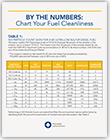How Clean Is Your Fuel?

Many people assume they’re buying quality fuel that meets the required specifications, so diesel fuel cleanliness is seldom questioned. However, fuel systems with higher operating pressures have lower system tolerances for contamination and require very tight filtration. These factors have pushed fuel cleanliness into the maintenance spotlight.
Fuel system pumps and injectors are most susceptible to contamination from micro-organisms, asphaltines, dirt, sediment and rust. These particulates will quickly clog fuel filters, erode injectors, cause valves to stick and damage or clog injector spray nozzles. This can lead to overfueling, inefficient combustion and piston wear.
How can you extend your fuel filter life and maximize injector performance?
Simple. Identify both the size and concentration of contaminant particles in your bulk diesel fuel supply and filter out unwanted contaminants.
How can you identify the size and concentration?
Perform an ISO Particle Count test on all of your fuel samples. An optical laser will count and report the number of particles present in each of eight micron ranges (spanning from 4 micron to 100 microns). An ISO Cleanliness Code is then assigned based on the number of particles present at the 4, 6 and 14 micron levels.
 Engine manufacturers are realizing diesel fuel cleanliness can have great impact on overall engine performance. In fact, many are now recommending diesel fuel that does not meet an ISO Cleanliness Code of 18/16/13 should be filtered before introduction to the fuel system. Surprisingly, more than 50 percent of samples tested by POLARIS Laboratories® do not meet the OEM’s 18/16/13 ISO Cleanliness Code recommendations. By these numbers, half of the diesel fuel in your bulk storage should be filtered before adding it to an engine’s fuel tank. Now, do you know how clean your fuel is?
Engine manufacturers are realizing diesel fuel cleanliness can have great impact on overall engine performance. In fact, many are now recommending diesel fuel that does not meet an ISO Cleanliness Code of 18/16/13 should be filtered before introduction to the fuel system. Surprisingly, more than 50 percent of samples tested by POLARIS Laboratories® do not meet the OEM’s 18/16/13 ISO Cleanliness Code recommendations. By these numbers, half of the diesel fuel in your bulk storage should be filtered before adding it to an engine’s fuel tank. Now, do you know how clean your fuel is?
Proven Impact. Proven Uptime. Proven Savings.
Let us prove it to you.



